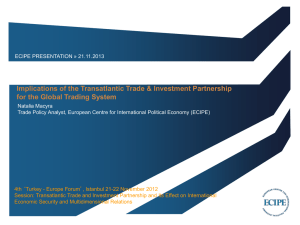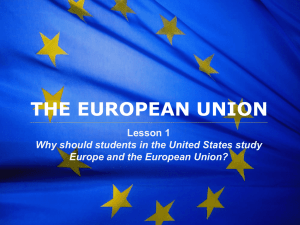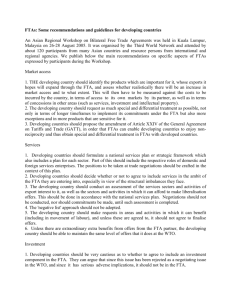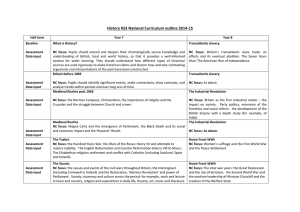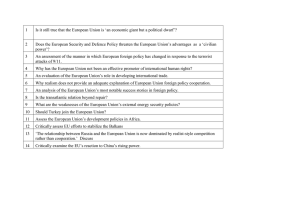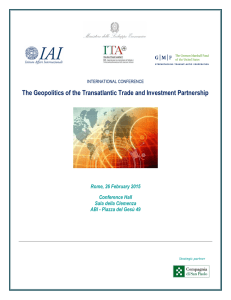BBL Seminar Handout Hosuk Lee-MAKIYAMA June 8, 2012
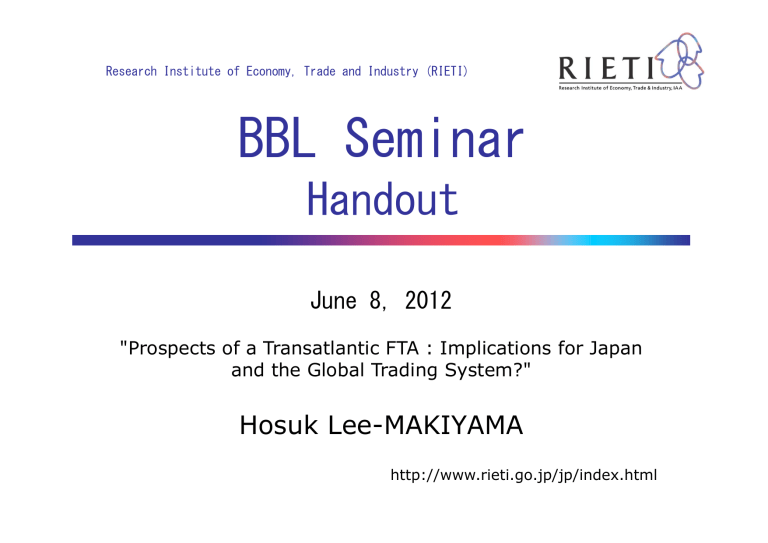
Research Institute of Economy, Trade and Industry (RIETI)
BBL Seminar
Handout
June 8, 2012
"Prospects of a Transatlantic FTA : Implications for Japan and the Global Trading System?"
Hosuk Lee-MAKIYAMA
http://www.rieti.go.jp/jp/index.html
ECIPE PRESENTATION » 08. 06. 2012
PROSPECTS FOR A TRANSATLANTIC FTA
IMPLICATIONS FOR JAPAN & THE GLOBAL TRADING SYSTEM
Hosuk Lee-Makiyama
Director, European Centre for International Political Economy (ECIPE)
»
Re-engineering the worldʼs largest economic link?
Bilateral trade and market space
» The transatlantic economy represents 54% of world GDP (2011)
» $5 trillion total commercial sales
» Employs around 15 million people in total
» EU and US together account for 25% of global exports; 32% of global imports
Investments
» Mutual investment stocks worth over €2.1 trillion
» 58% of global inward FDI stocks
» 72% of global outward FDI stocks
High degree of intra-firm trade
» 61% of U.S. imports from the EU ;
» 31% of U.S. exports to EU
2
»
Previous transatlantic initiatives
3
1995 —New Transatlantic Agenda,
Transatlantic Business Dialogue
1998 —New Transatlantic Marketplace
» Proposed by Sir Leon Brittan after completion of the Single Market and
WTO
» Tariff elimination, services FTA, extension of MRAs
2007 —Transatlantic Economic Council
» Reduce barriers to TA trade and investment
» Enhance economic integration and growth
Disappointing results
» Before 2011, only resulted in “open skies” and weak co-operation agreements on IP, innovation, energy
»
European scepticism to a Transatlantic FTA
”A bilateral EU/US FTA would undermine the multilateral system”
» EU moratorium on FTAs (until Global Europe, 2007)
» Strong commitment to the WTO system within the EU trade leadership
Ideological divide between EU/US after 9/11
» Liberal, free trade order replaced by mercantilism or priority to foreign policy
» German and French opposition to Iraq war
Sectoral approach to US-EU cooperation
» Trade & investments considered to be already liberalised
» ʼSmallʼ gains not worth the effort or difficulties to make concessions
‣
‣
Non-tariff barriers being the main obstacles, significant potential gains from elimination but difficult to negotiate
Mutual recognition; regulatory harmonisation
Impossible to do a FTA while excluding sensitive sectors
» GATT Art XXIV
»
Shifting trade priorities
From Doha impasse to bilateral FTAs
» Yet little economic value in small FTAs (< 0.1% of GDP)
» Focus on ʼbigʼ trading partners
New trade issues and barriers
» From manufacturing tariffs to services and NTBs
» Potential common positions
Rise of emerging countries and Asia
» Necessary to coordinate against BRICs
2008 sub-prime crisis and the euro-crisis
» Sensitivities in manufacturing
» Soft mercantilism
» Domestic lobbies, especially in manufacturing
‣
‣
Need for growth to sustain current levels of employment and re-balance current account
Difficulties to conclude FTAs with export-driven economies
5
»
ECIPE/GMF Transatlantic Task Force
» Members
‣
‣
‣
‣
‣
Chairpersons ̶ Ewa Björling (co-chair), Minister of Trade, Sweden; Jim Kolbe (cochair), fmr U.S. Congress
Policy makers ̶ Jennifer Hillman, Member of the WTO Appellate Body; Charles P.
Heeter Jr., Chairman of OECD Business and Industry Advisory Committee; Erika
Mann, EU Director of Facebook, former European Parliamentʼs Committee on
International Trade; Hugo Paemen, Former EU Ambassador to the U.S, Ana Palacio, former Minister of Foreign Affairs of Spain, Senior Vice President of the World Bank;
Susan C. Schwab, former US Trade Representative
Business ̶ Thomas Harris, Vice Chairman of Standard & Chartered; Charles S.
Levy, Cassidy Levy Kent; James H. Quigley, CEO, Deloitte Touche Tohmatsu;
Academics ̶ Prof Dan Drezner, Fletcher School of Law and Diplomacy; Prof Patrick
Messerlin, Sciences Po, Chairman of UN Millennium Development Goals Task Force
Drafting & research ̶ ECIPE secretariat; (Bruce Stokes (GMF), Bruce Wilson (fmr
WTO legal division) also rapporteurs
» Main conclusions:
‣
‣
‣
‣
‣
‣
”The EU and the U.S. should move to a barrier-free transatlantic marketplace for trade and investment”
Deeper transatlantic economic integration creates momentum for multilateral trade liberalisation
Decentralised and sector-driven approach as part of an ambitious deal
Initiatives based on preferential market access (non-mfn), but open for anyone to join
Active involvement of private sector stakeholders in the negotiating process
Revitalised idea-based leadership on trade
»
Taskforce recommendations
EU/US bilateral relations
» Tariff elimination (Transatlantic
Zero-tariff Agreement)
» Regulatory cooperation to eliminate NTBs
» Substantial liberalisation of trade in services
» Intensified cooperation on FTAs with third countries
» Launch negotiations on a bilateral investment agreement ( BIT ) with strong disciplines
» Bilateral public procurement agreement
Joint-multilateral initiatives
» Plurilateral/sectoral agreements
‣
Full coverage digital economy agreement
» Preferential agreements among
”coalitions of the willing”, open for others to join ( non-MFN , no free-riding)
» Plurilateral framework agreement in services
» Closer EU-U.S. cooperation to promote enforcement of disciplines on subsidies and stateowned enterprises
» Strengthen the WTO Trade Policy
Review mechanism ( TPRM )
» Expand Government Procurement
Agreement ( GPA ) even further
»
Broad political support
8
»
Recent developments
High-level Working Group on Jobs and Growth
‣
‣
‣
‣
‣
Tariffs
Services and investment;
Compatibility of regulations and standards;
NTBs
Rules and principles on global issues of common concern, shared economic goals relating to third countries.
» Interim report June 2012, final report with recommendations due end of
2012
EU/US Trade Principles for Information and Communicaton Technology
Services, April 2011
Statement of the EU and the United States on Shared Principles for
International Investment, April 2012
Mutual Recognition Agreement for Authorised Economic Operators, May
2012
»
State of play: Strong political interest but underestimation of difficulties
Chapter by chapter approach?
» Preferred by EU/US business over single undertaking
Transatlantic zero-tariff agreement
» GDP increase: 0.32~0.47% for the EU (or $46~$69 bn), 0.99~1.33% for the US ($135~$181 bn)
» Tariff peaks and NTBs (chemicals, pharmaceuticals), agriculture
Separate Services and Investment FTA?
» Prioritised by the US industry
‣
With real market access, not binding of existing liberalisation
» Sensitive sectors
‣
‣
‣
Examples: audiovisuals, air transport, electricity, telecom; transport, maritime, postal services
State-level commitments
Investment ̶ new EU Commission competence, without a coherent EU policy, existing bilateral agreements between the US and EU member states
Public procurement
» Perception that the EU is more open than the US, 13 US states do not participate in the GPA
»
»
Implications for Japan and the trading system
11
» Indirectly a new priority in EU trade policy
‣
‣
‣
Completes EU strategy to mitigate NAFTA (Mexico 1997, Canada
2012/2013)
Lack of political support for WTO & Asia-Pacific
Protectionist industries in the EU support EU/US FTA
» Spill-over to other FTA negotiations, incl. Japan
‣
‣
‣
US sets a new level of demands on EU sensitive sectors
Negotiation on regulatory co-operation/NTBs – common situation on ECE
Chapter-by-chapter negotiations amongst top 5 economies? Belief that single-undertaking is necessary against Asian trading partners
» The US may demand a scoping exercise with EU
‣
‣
Dangerous precedence set by EU-Japan FTA
US worry about lack of concessions from EU (the EUʼs inner/outer link)
» Overlaps and conflicts with multi/plurilaterals
‣
‣
‣
ʻIdeological disagreementʼ on:
MFN – example: International Services Agreement (ISA) or strengthening GATS, ICT-only
Role of the WTO and Doha ̶ is EU/US FTA a building block or a stumbling block to multilateral co-operation?
» A new transatlantic leadership emerging?
‣
‣
Transatlantic FTA with cross-ownership, MNCs and shared business/policy culture – creating a new trade policy coordination and standard-setting mechanism?
Impact on the influence of Japanese business?
ECIPE — European Centre for International Political Economy
Hosuk Lee-Makiyama
Director hosuk.lee-makiyama@ecipe.org
